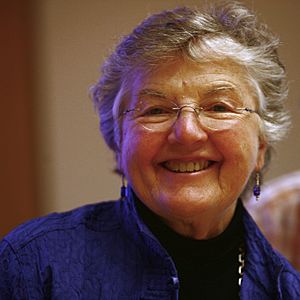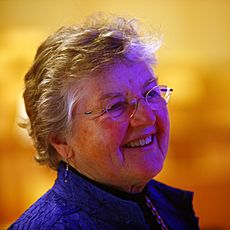Frances Allen facts for kids
Quick facts for kids
Frances Allen
|
|
|---|---|
 |
|
| Born |
Frances Elizabeth Allen
August 4, 1932 Peru, New York, U.S.
|
| Died | August 4, 2020 (aged 88) Schenectady, New York, U.S.
|
| Nationality | American |
| Alma mater | State University of New York at Albany (BS) University of Michigan (MS) |
| Spouse(s) |
Jacob T. Schwartz
(m. 1972–1982) |
| Awards |
|
| Scientific career | |
| Fields |
|
| Institutions | IBM New York University |
Frances Elizabeth Allen (August 4, 1932 – August 4, 2020) was an American computer scientist. She was a pioneer in making computer programs run faster and more efficiently. Allen was the first woman to become an IBM Fellow, which is a very high honor at IBM. In 2006, she became the first woman to win the Turing Award. This award is often called the "Nobel Prize of computing." Her work greatly improved compilers (programs that translate code) and parallel computing (making computers do many things at once). She worked for IBM from 1957 to 2002.
Contents
Early Life and Education
Frances Allen grew up on a farm in Peru, New York. She was the oldest of six children. Her father was a farmer, and her mother was an elementary school teacher.
She went to a one-room schoolhouse near her home. Later, she attended a local high school. In 1954, she earned a Bachelor of Science degree in mathematics. She got this degree from what is now the State University of New York at Albany.
After college, she taught school in Peru, New York, for two years. Then, she went to the University of Michigan. In 1957, she earned a Master of Science degree in mathematics.
Career and Computer Research
Frances Allen joined IBM Research in 1957. She needed to pay off her student loans. At IBM, she taught new employees how to use Fortran, an early programming language. She planned to go back to teaching, but she ended up staying at IBM for 45 years!
Working on Secret Projects
In 1959, Allen worked on the Harvest project. This project was for code-breaking with the National Security Agency. She helped develop a programming language called Alpha. She also led the team that made compilers more efficient for Harvest and another project called Stretch.
In 1962, she moved to the Thomas J. Watson Research Center. There, she worked on the ACS-1 project. In the 1970s, she contributed to the PL/I programming language.
Making Computers Faster
During these years, she worked with another researcher, John Cocke. They wrote important papers about optimizing compilers. Compilers are programs that turn human-readable code into machine code that computers understand. Their work helped make this translation process much faster and more efficient. This meant programs could run quicker.
Frances Allen also spent time at New York University and Stanford University. She was an adjunct professor at NYU for several years.
Leading Parallel Computing
From 1980 to 1995, Allen led IBM's work in parallel computing. This is a way to make computers do many tasks at the same time. She helped create software for the IBM Blue Gene project. This project built very powerful supercomputers.
In 1989, Frances Allen became the first female IBM Fellow. This is a very high honor for scientists and engineers at IBM. She retired from IBM in 2002. Even after retiring, she continued to encourage women and girls to pursue careers in science and computing.
Her work had a huge impact on how compilers work. She helped create the basic ideas and methods for making computer programs run better. She showed how to analyze programs to find ways to make them faster. Her ideas are still used in modern compilers today. She also helped develop ways for computers to automatically run programs in parallel, which is key for powerful computers.
Awards and Honors
Frances Allen received many awards for her important work. She was a Fellow of the Institute of Electrical and Electronics Engineers (IEEE) and the Association for Computing Machinery (ACM). In 2000, she was honored by the Computer History Museum.
She was elected to the National Academy of Engineering in 1987. She also became a member of the National Academy of Sciences in 2010. In 1994, she was named a Fellow of the American Academy of Arts and Sciences.
Allen received the IEEE Computer Society Charles Babbage Award in 1997. She also won the Computer Pioneer Award in 2004. In 1997, she was inducted into the Witi Hall of Fame. She won the 2002 Augusta Ada Lovelace Award from the Association for Women in Computing.
Her biggest award was the 2006 Turing Award. This award is given for major contributions to computer science. She was the first woman to ever receive it in its 40-year history. After winning, she said she hoped it would create more chances for women in science, computing, and engineering.
In 2009, she received an honorary degree from McGill University. This was for her groundbreaking work on compilers.
Personal Life
In 1972, Frances Allen married Jacob T. Schwartz. He was a computer science professor at New York University. They divorced in 1982.
Frances Allen passed away on August 4, 2020. It was her 88th birthday. She died from complications related to Alzheimer's disease.
See also
 In Spanish: Frances Elizabeth Allen para niños
In Spanish: Frances Elizabeth Allen para niños
 | Delilah Pierce |
 | Gordon Parks |
 | Augusta Savage |
 | Charles Ethan Porter |


